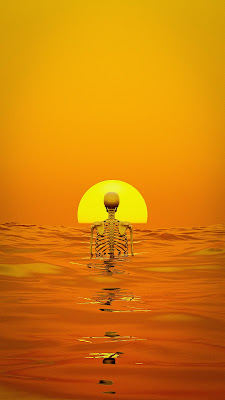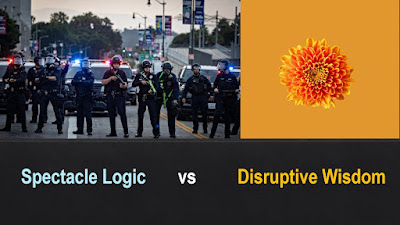Sermon: Healing Through New Theological Imagination
Scripture: Mark 10:23-27
 |
| Photo by Shubham Dhage on Unsplash |
As we enter the annual and always-special time of summer, I’d like to offer an invitation to take a deeper dive into spirituality, especially now, when the world feels both interesting and destabilizing. On this blessed part of the earth, Summer, at least this year, is progressing as expected. We feel ready for rest, peace, and joy. Meanwhile, the world around us, as the media constantly reminds us, is experiencing change and destruction.
Cameron Trimble named it well: we are living in times of the “collapse” of the world we’ve known. The global rise of fascism. Wildfires. The genocide. Bombing threats. One ‘big, beautiful bill’ —disguised as security, built on erasure. The weaponization of bad theology. The disappearance of legitimate diplomacy, and the endless presence of lies. A ceasefire always just out of reach. What we see happening south of the border and in the rest of the world - it never feels far away.
It almost makes us believe that disengaging is a choice. That it’s okay to go silent, to pull back, to care only for the well-being of our immediate families and friends. And it feels, in this time of collapse, like that’s already a lot, maybe even more than we can handle. Psychologically, the system we’re living in conditions us to shut down. It trains us, through repetition, to expect harm, and then to normalize it. This wears down our spirituality. It drains our capacity to feel, to care, and to respond with presence instead of retreat. We normalize, perhaps even adopt, numbness toward cruelty, confusion, and spectacle.
The narrative around a second term of Donald Trump in the U.S. accelerates this collapse. It digs the trenches deeper. And it feeds us the lie that somehow, this is the narrow way—the “eye of the needle”—we all must go through, no matter the cost. The Empire’s narrative of the eye of the needle feeds on the collapsing empire’s logic of separation: SAVE YOURSELF ALONE: go through it and prove you can pass.
To me, the eye of a needle for a camel is a powerful metaphor of how the world is collapsing: the pressure, the narrowness, the separation. If we associate the Kingdom of God with the pain and the impossibility of a camel going through the eye of a needle, then anyone with common sense would likely be overwhelmed from the start, just like the rich young ruler, who, though deeply grieved, chose to walk away. Many would numb their soul and leave at once, without even attempting to navigate that kind of pressure.
If we think of the Kingdom of God, entering God’s realm of new possibilities, as something that only comes through the pain and cost of self-relinquishing, like the camel through the needle’s eye, then we might want to choose living in the time of collapse. We might not choose the Kingdom of God, which feels more difficult.
But I see a new question in this passage. If we have the courage to see and associate the Kingdom of God as being broadly available to everyone and as the journey that will bring us a profound and transformative JOY, wouldn’t we consider taking the path to the Kingdom of God? We can abandon the fear-based narrative of the eye of the needle, and focus on understanding the joy-filled aspect of God’s new reign. Instead of the overwhelming sense of what we assume we must sacrifice, we can centre JOY as our response to Jesus’ invitation to the Kingdom of God.
As long as we are stuck in the assumption that the way out of collapse and the movement into God’s reign is like a camel going through the eye of a needle, we will always stay there. We will always see it as an impossibility: a shrinking and shedding we simply cannot bear.
To the disciples and those around them, who were greatly perplexed and astounded, saying to one another, “Then who can be saved?” Jesus looked at them, at their wonder, confusion, and cautious hope, and said: “For mortals it is impossible, but not for God. For God, all things are possible.”
However rich we are, or however poor we are, if we can centre the JOY of the Kingdom of God in this work of healing through new theological imagination, we will find the way.
I find Cameron Trimble’s wisdom and spiritual insight to be deeply insightful. One day, after sitting through back-to-back meetings with good, smart, compassionate people—all trying to save something: the planet, democracy, the church, the collective future—Cameron noticed something. Everyone came with the best of intentions, bringing their full selves, organizing, strategizing, mapping, analyzing—working hard to make an impact. But beneath the surface, Cameron sensed a pattern: Even our best efforts were still relying on the same logic that created the crisis in the first place: speed, control, linear thinking, institutional structures. We’re trying to organize our way out of collapse using the very tools that built it.
Cameron asks:
What if saving the world as we know it was never the point? What if the era of problem-solving is giving way to something else?
What if what’s needed now is sacred accompaniment, learning to stay with one another, stay with the earth, stay with the brokenness, not to fix it, but to feel it?
If we shift from thinking in terms of strategy to thinking in terms of story, of relationality, a new kind of clarity emerges. It doesn’t move through spreadsheets, but in the dark, through the marrow, in the quiet fidelity of those who refuse to leave one another, no matter what comes, who protect the vulnerable, not the powerful.
It’s a shift from:
Strategy → Story
Systems thinking → Relational sensing
Scalability → “Soil-ability” (What can grow here, now?)
Problem-solving → God’s Kingdom pattern emerging
Deliverables turn to Devotion
We would feel overwhelmed and tempted to give up, if we associated the invitation to the Kingdom of God with a painful, narrow, grinding, single-lane journey through the eye of a needle, if we believed it meant only self-relinquishing sacrifice, loss, and pain. No.
When you are stuck or struggling, like the rich young ruler, and you find you cannot move forward…
YOU STOP. WE STOP.
And let God work.
We stop trying to hold everything together by force. Instead, we start gently creating space where God’s presence can show up. Rather than rushing to fix things, to figure it all out, to fight, or to run away, we choose to stay, and open ourselves to the possibility of deep listening.
“When everything is uncertain, everything that is important becomes clear.”
—Sister Joan Chittister said
The Time of Collapse vs. The Kingdom of God: A Contrast
The time of collapse is like:
– when everything is shouting, just as now: media, politics, institutions, even our own fear.
– when Isaiah’s cry echoes again: “Woe to those who make unjust laws, to those who issue oppressive decrees, to deprive the poor of their rights and withhold justice from the oppressed of my people.”
– when politicians act like warlords.
– when democracy and diplomacy erode.
– when authoritarians not only thrive in chaos, they manufacture it.
How do we organize our way out of collapse?
Well, there is Spectacle Logic VS. Disruptive Wisdom
• Spectacle Logic Reacts with volume vs. Responds with presence
• It Escalates to be seen vs. Grounds to reweave trust
• It Seeks moral victory vs. Extends moral invitation
• Spectacle Logic Reinforces separation vs. Embodies deep listening
When the world numbs, stay tender. Stay tender to remain attuned to both pain and possibility.
Know that the path forward does not lie in shock or speed, but in our willingness to sit in stillness, to breathe, to feel what is true, and allow that truth to shape us into more faithful, courageous people.
Does the rich young ruler have hope? YES. Just like us. Scripture says he was deeply saddened. He had so much: privilege, wealth, the status that relied on the material foundations of the world around him, even while it may have been shaken and collapsing.
But the story doesn’t tell us what he did—or didn’t do—after that. I wonder: was walking away really the end of his life’s story?
This story is not meant for us to, on one side, delude and hide our own complicity in the collapsing Empire, and on the other side, blame and judge the rich young ruler’s inability to follow Jesus.
If we focus only on the cost, the loss, and the impossibility, that it is harder for a rich person to enter the Kingdom of God than for a camel to pass through the eye of a needle, then this story becomes deeply self-defeating.
But—what if we centre the joy-filled invitation to God’s Kingdom? This profound and transformative joy can never be found in anything shaped by the collapsing Empire’s logic and its narrative about what is eternal.
In the Canadian context, could we wonder what this “soil-ability: What can we grow now” might look like? What can we grow when we let go of everything else, but do not accept the mandate to repatriate land and life of Indigenous Peoples? What does that mean for us? How might that letting-go become joy-filled? How might it shape a transformative spirituality? Where might we begin?
We stop when we are stuck… God continues where we stop.
As I read Cameron Trimble’s work,I was reminded: Behind everything—
every policy,
every decision,
every executive order,
every law—There is a why.
And behind the why,
There is theology.
Theology is about how we understand: God, Self, Earth, And other beings.
It’s how we define kinship. And how we define who we are.
When the world feels loud, jagged, dissonant with fear and urgency,
what kind of spirituality,
what kind of theology,
what kind of cosmology
would you let centre you?
- The sacred accompaniment,
- Reverence,
- Resonance to life.
– Finding coherence within you which truly stabilizes you:
– Centre Joy.
In that spirituality space, we might begin to recognize the counter-patterns of the Kingdom of God those that arrive into our lives like: Wilder Simpson’s words:
“Jumping into a river in June, or holding someone they love.”
We are allowed to be “tender, afraid, and courageous enough to try anyway.”
When we say yes to God’s invitation to the Kingdom, it’s like saying: “You’ll leave knowing strangers—and yourself—into the next sunrise.”
Do you have a story you carry to remember the tender coherence you could find and create within yourself and with others through deep listening, through attunement?
It was long ago, and I often forget, but it remains in me. In June 2014, as a young, often lonely mother, I would take my two children, then ages three and eight, to Transfer Beach in Ladysmith. We lived there for three years, but I never entered the water. I watched them play in the sand and on the playground, and I never stepped in past my ankles.
The day before we moved to Winnipeg, I realized: I had never gone into the ocean. I’ve always loved water. I didn’t want to leave with regret. So on that final day, I went alone and stepped in.
The cold waves startled me at first. But as they wrapped around me, I felt, despite the people nearby, as if I became one with the mountains and the ocean, creating a quiet sense of Trinity.
The waves felt thick and soft, like a blanket. The deep water’s buoyancy blurred the boundary between my body and the sea and the surface sparkled just beneath my chin.
That moment when the sea and I met was so profound, I carry it as the story in which I discovered tender coherence and sacred attunement—a moment of finding myself within the cosmos.
The Kingdom of God is always available. When we relinquish our reliance on the collapsing world’s logic: spectacle, urgency, speed, and the illusion that we must always fix everything, we entrust ourselves instead to the soil-ability of now.
We learn: healing comes through a new theological imagination of the world.
If, like the rich young ruler, we were asked right now to relinquish everything, for most of us, it would be nearly impossible. Without a deep immersion in intense spirituality, it simply cannot be done.
But if we are the church, if we are in this together, then we can step into the emerging patterns of God’s soil-ability: the seeds for justice and peace, for decolonizing and reconciliation. We can truly step into the sea of change.
Individually, it’s hard. But as a church, we can do it.
And if the church cannot, then what spirituality and theology are we really based on?
When the world numbs us again and again this summer, when it overwhelms us with spectacle and chaos, we are given the invitation to become God’s stitchers of sacredness: to pick up the sewing needle and weave new sacredness in the multicoloured hues of a new sunrise, each day, in small, sacred ways with reverence, stitching together an imperishable kingdom.
Benediction
In the collapsing world’s logic, there is no sun.
Not even a sunset—only the absence of light.
But the Kingdom of God enters through the tenderness of a first sunrise,
and through the hush of a quieting sunset.















Comments
Post a Comment